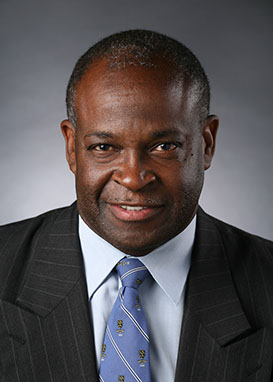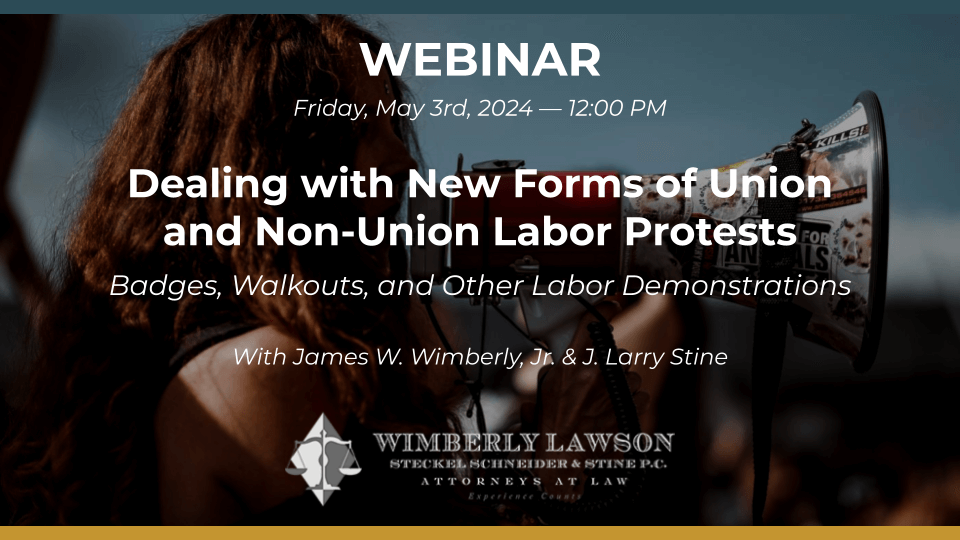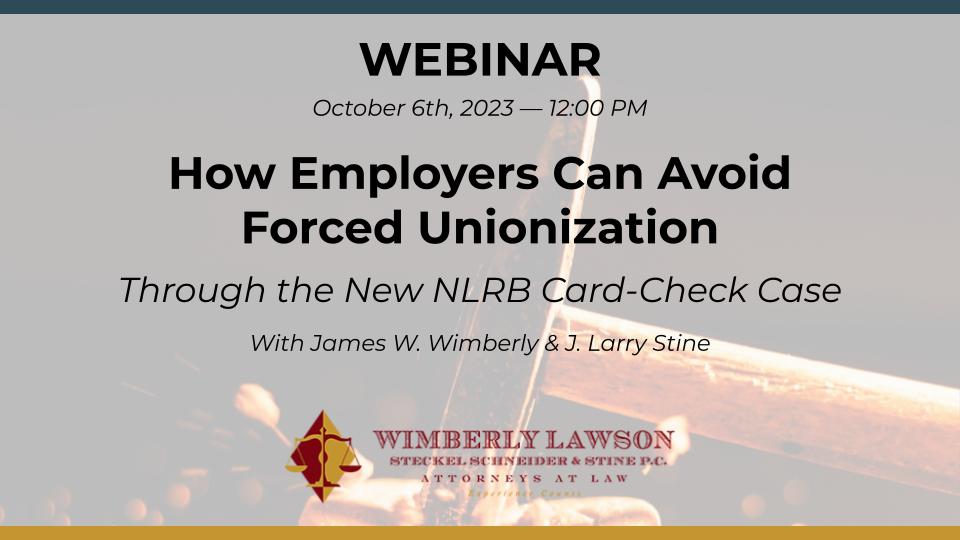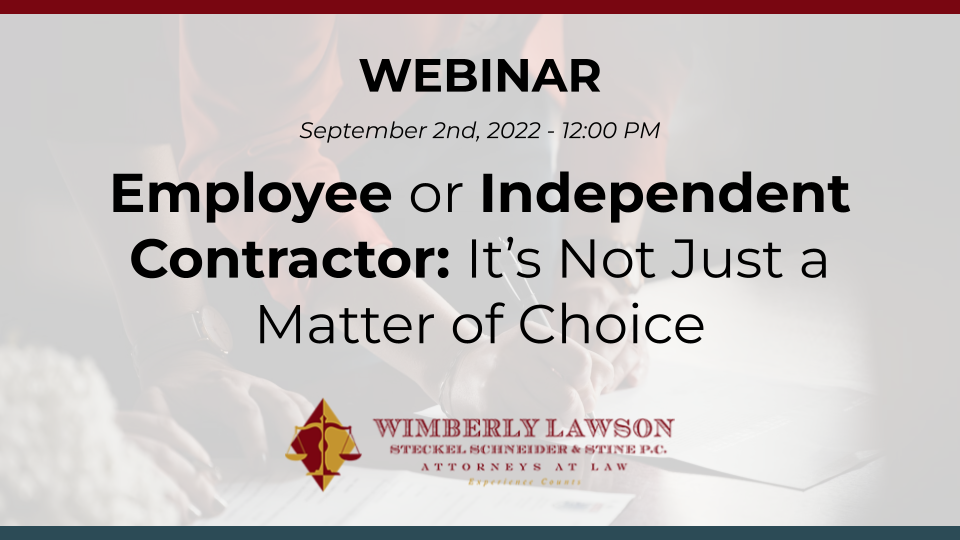
Webinar: 10 Things That Might Make Your Company an Attractive Target to a Plaintiff’s Lawyer
One of your current or former employees meets with an attorney with the goal of filing a lawsuit against your company. When that attorney investigates your company, does she see an attractive target? Our three experienced litigators will discuss ten factors that can make a company more attractive to plaintiffs’ lawyers, and therefore, make your company more likely to be sued. They will also discuss some of the steps you can take to make your company much less attractive to those same plaintiffs’ lawyers.
Presented by Paul Oliver, Jim Wimberly & Kathleen Jennings.



Watch This Webinar
Webinar Transcript
Kathleen Jennings (00:00):
Everyone welcome to our latest webinar, which is about 10 things that might make your company an attractive target to a plaintiff's lawyer. And my name is Kathleen Jennings. I'm one of the attorneys at Wimberley Lawson. I am joined by my various esteemed handsome colleagues, Jim Wemberley and Paul Oliver. And we are going to talk about those 10 things that will make you a potential target. We are litigators, all three of us. In fact, I am proud to say that I have tried cases with both Jim Wemberley and Paul Oliver. Paul and I had a case where we received a defense verdict down in Macon, Georgia in about 30 minutes in a race discrimination case. And Jim and I tried a case, one of our rare plaintiff's side cases where we obtained a 1.7 million verdict against a union. And even better we recovered that money for our client.
Kathleen Jennings (01:04):
So it was a collectible verdict and it was a lot of fun. Jim and Paul have a lot of experience in background. You can go to our website, www.wimlaw.com to get their biographies. I will point out that Paul is also a certified mediator, so he brings that perspective to this issue as well. As I said, we're all litigators. We like to litigate. We are not afraid to litigate matters for our clients, but we recognize that litigation is expensive and litigation can cause a lot of problems for a company. So that's why we're here today to talk about some things that would make you less of a target for litigation. This seminar or webinar will be presented in three parts. The first part will be the substantive topic that we're going to talk about. After that, we're going to have Jim present some news of the week some up, some hot topic that he wants to talk about.
Kathleen Jennings (02:10):
And then we'll leave some time at the end for questions and answers. So if you have questions, that will be a great time to ask them. You can also use the chat feature on the zoom if you want to write out some questions or after the webinar is over, please feel free to reach out to any of us by email or by telephone. Our contact information will be provided at the end, and you can also go to our website and get more information on how to get in touch with us. So Jim and Paul, let's talk about these 10 things. And I'm gonna share my screen here because we actually have a nice presentation for it. And here's, okay, here's the structure of the webinar, and we will start with number one. Jim, let's why don't you take us off?
Jim Wimberly (03:09):
Okay. Well some would say that no company has no written policies or procedures, and there may be some truth to that, but this affects everybody listening and every company because it deals with the extent to which you need written policies or procedures. Almost all commentators, experts and the unsigned individuals myself, believe in written p policies are procedures. And I'll tell you some of the reasons why. Number one, it's a way of preserving or even improving management rights. Now, you may say, well, how can that be? Am I not limiting myself and destroying my flexibility when I put my, our policies and procedures in writing? I would say as a general rule, the answer to that question is no. Because you can, number one, bill flexibility into your policies. You don't have to say every, every time somebody violates a rule, it's an automatic discharge.
Jim Wimberly (04:20):
You can either have ranges of, of discipline for each offense a progressive discipline policy, but even a progressive discipline policy should have flexibility built into it to skip certain steps based on a seriousness of the offense. Or you could simply list the rules and then say that the discipline will vary based on the specifics of the violation and the past record of the employee. But let me give you an example as to how management rights can be preserved. Let's take family and medical leave act. If you don't have a written policy as to how you compute the 12 months in which an employee has a right to take 12 weeks of family and medical leave, the law says the employee can use the most favorable interpretation of what that means. So the employee can end up with 24 weeks of guaranteed family and medical leave rather than 12.
Jim Wimberly (05:29):
And you say, well, how can that occur? Well, if he can adopt any concept of 12 months, he wants, there can be 12 months during one year up to the date of the incident and then 12 months for the following year and end up with 24 months. Secondly, you have the right to build into your leave policies, obligations on the part of the employee to give prior notice or call in during periods of absences. And this can go way beyond and separate from your obligations under the F M L A, which gives you additional rights you may not otherwise have under the F M L A. But let me give you two more examples. Reasonable accommodation policies. People with disabilities, if you have a good policy saying who they should request accommodations from you have a right to enforce that policy. And you're not bound by an employee just telling some minor supervisor lead person, they want an accommodation.
Jim Wimberly (06:42):
Cause you can insist employee follow the policy set forth in your written policy, or it may be a, an harassment complaint. The employee may say, well, I told my lead, or I told so-and-so about it coming into a thing. Well, how did your policy, who a harassment complaint should be reported to a particular person or our office? There? There are many other examples I could give of preserving management rights by having written policies. I've talked about how you can build flexibility into your policies. So the biggest downside to having written policies and procedures as I see it, is not updating them occasionally. And it's not like you have to rewrite a whole policy. You can do an amendment to it or what have you, but that's really the only, if you've written your policies and procedures correctly. The only downside I say it can help you defend policies. Indeed unions say, Hey, we need to have a union here cause we don't have the only thing you can look to for God. So a union contract, that's what your handbooks are for and your policies and procedures for, I think enough said on that.
Paul Oliver (08:02):
Well, Jim, I agree with that. I i i, it seems that it would be obvious that in this day and age, if you have an entity, everybody should know what the rules of the role are. That's what your policies and procedures do for both management and employees. It provides the rules of the road. And that's better for management because they know what it, what to expect as do employees.
Kathleen Jennings (08:34):
And I would also add just to, I I think to both points, which are, are well taken, if you have written policies, you do need to follow them. Don't have a policy that you completely ignore and do something other than what the policy says. It's better not to have a policy at all if, if you're gonna have a policy that you're not going to follow. Well, number two on our list and, and this is mine. And I wanted to backtrack a little bit because I forgot to mention during my introduction that some people may have noticed the less than luxurious table that Paul and Jim are sitting at. And that is because our office is undergoing some renovations to make the office even more u more useful and more attractive than it is right now. So please pardon our plastic table because better things are coming.
Kathleen Jennings (09:41):
So just wanted to get that on the record as they say. For number two another way that you can make your company attractive to a plaintiff's lawyer is not to document your discipline or counseling. The purpose of having documentation of those incidents is so that you have a record that they actually occurred. That you can, as a company, provide evidence that this discipline or counseling occurred. And it's probably best to have a witness also to whatever those meetings are. And really the best practice if you can, is to get the employee to sign off on any documentation of discipline or counseling, because there are some employees who will say, if my signature is not on this document, it didn't happen. So if possible, you want the employee's signature to acknowledge that the meeting happened. Maybe they don't agree with the discipline or the counseling, but at least they can, they can say that it happened. And if they refuse to sign, then someone should write down, refuse to sign and sign that as well with a witness. But otherwise, if you get into litigation with an employee and there's no document particularly a progressive discipline where there's legitimate issues, then the case is gonna come down to that employee or ex employee's word against your employees, and the jury's gonna decide who they believe. So it's always better to have documentation to back up what you've done
Paul Oliver (11:25):
In conjunction with that. And this day when you go to court where if an employer doesn't have the records, there is a presumption to some extent against them. And that's what plaintiff's lawyers look for. A situation where the company has not protected itself by having uniform ways of recording and keeping discipline or counseling because that's
Jim Wimberly (11:52):
Expected. So when you don't have it, then you're, you are a target.
Kathleen Jennings (12:01):
Absolutely. number three, lack of training of managers and supervisors. Jim, tell us about this one.
Jim Wimberly (12:12):
First of all, supervisors aren't inherently gifted with knowledge of good human resource practices and legal considerations. Many supervisors, most supervisors come up from the ranks. They've been around a long time or they're deemed to have certain good old person characteristics, whatever you wanna call it, or they have certain technical skills. And it is really shocking how important training is to avoid horrendous situations that don't look good in court. And how supervisors often aren't sensitive to realizing that these can result in serious problems and they either need to do something better on a spot or a report. We'll get into some of these examples later, but I will tell you in almost every case, litigated in court the training of managers and supervisors is gonna be an issue. And I must admit, I have been shocked participating in certain depositions, interviews, whatever you wanna call it, in which supervisors are asked, how much training did you get on such and such a point?
Jim Wimberly (13:46):
Did anybody in the company ever give you guidance on how to handle that situation? And oftentimes, supervisors and managers don't remember the training or what have you. And it really looks bad in, in court. Now, we will go through later in this program today some of the sensitive items that come up. Just to give you an example, I mean an extreme example. I remember I had a case one time in which literally everybody in the workforce, this was an auto dealer, were minorities of some type. They were, and largely either African American or Arabs. And they had names they used towards each other. I don't doubt that that was just the way of talking there, but the names they called each other and so forth were very inappropriate. And that was a big issue in the case. Now, you know, you, you don't think of creating big legal problems when you've got all minority workforces, but believe me, they, they can happen.
Jim Wimberly (15:08):
Each individual is entitled to protection from discriminatory words. Bias comments, even jokes today are largely off limits. Our supervisors and managers have to know this. They have to know what to do when things like this occur and we need to document that training they receive because that will avoid or lessen the big problem. And even if the big problem occurs, we'll be able to show we did what we could. And so the amount of training managers and supervisors get, it's gonna be an issue in almost every case because in litigation now you can get convinced to imp punitive damages. In some cases, the activity is deemed not responsible on the company's part. Cause they did everything they could. They trained their supervisors, they had the right policies, and the supervisor went off on alar of their own. The model for all this training of managers and supervisors is possibly safe to train. Cause many companies conduct a significant amount of safety training. They're often required to do so, and they keep careful records. Now, one could ask, how often do you have to train managers and supervisors? Some of the safety rules have more specific rules on this, but generally, you at least need to do training annually. I believe that covers that safety.
Kathleen Jennings (16:45):
Thank you, Jim. And, and on the safety side, I, you know, I handle OSHA investigations from time to time, and one of the first things an OSHA investigator's gonna ask for are training records of involved employees. So it is very important in the safety realm to have that training done and to document that the training occurred. Number four, no effective internal invest or no effective internal complaint procedures. Paul, why don't you tell us about this one?
Paul Oliver (17:21):
The important thing about this one is that most companies these days do have some policies, procedures, and in an internal complaint procedure they're required by law to have it with respect to certain things like sexual discrimination and and that type of thing. So most of them do have sexual discrimination policy or racial discrimination policy that provides a complaint procedure. I would recommend that not only that your complaint procedures include those things, but also broader mal actions misconduct by that is experienced in the workplace, including bullying and things of that sort. The operative thing here is not just to have an internal complaint procedure, but to make it effective. In order to do that, you've gotta have a culture and a management that is responsive to making sure that the complaint procedure is adequate and followed. I remember Kathleen didn't tell you, but there was a brief period in my career where I was on the other side following a lot of plaintiff's cases about 20 years ago.
Paul Oliver (18:52):
One of the first cases I had was a sexual discrimination harassment case. And it was against a a public organization and it was by a secretary against the executive director. They had procedures for the procedure required that if she complained, has she had the complaint, ultimately ended up with him and she complained. And of course, nothing happened ever. Well, I was very glad to be a plaintiff's lawyer in that case because the jury rewarded her significantly because they had a complaint procedure. They didn't follow it, and it damaged her because every time she complained, he retaliated or he did something that he was not allowed to do because there was no restraints on him. So it's important that if you set up a procedure that it is broad enough and adequate enough for an employee to complain about his supervisor and up the chain without retaliation and without that person being able to control the complaint procedure.
Paul Oliver (20:12):
So an effective one is very, very important with, particularly with respect to prohibited actions, but other improper things as well because it ultimately revolves into how your workforce is going to to look at management. If there is no way to adequately get redress, then there's, there's going, there's not going to be a very happy workforce and then a not very productive after that. So having an internal complaint procedure is important, but making it effective is the most important thing. It has to be effective. It's worse if you have one and it isn't effective.
Jim Wimberly (21:05):
Let me make a comment on when I haven't been in charge of the topic. I don't know that I've ever been to a employer and asked the question if they have a complaint procedure that didn't answer, oh yeah, we got one. So I typically the next ask what is it? And they typically respond, oh, we have an open door system here. People come to me. I'm always oppos. I typically then next ask the question, how often do you they use that procedure? And I would add to the concept of an effective internal complaint procedure that it's one that's actually used. Cause if it's people have complaints, so would we rather they make their complaints to their coworkers and they all get upset and quit us in the great resignation, would we rather they make the complaints to a government agency? You have to hire lawyers to come in and defend the investigations and maybe the lawsuits or would the, we rather they honor us with presenting the complaint complaints internally where we can quickly and relatively cheaply do something about it.
Jim Wimberly (22:33):
So it, it's very important. I also go back to the point that to, and I'll mention this perhaps later. We have a very pro-union administration and we have an environment where 68% of the public, according to the Gallup Poll, thinks unions are good. And we also have a lot of upset workers through various things. Covid hadn't helped. And if we don't have an internal outlet for them to come to up us and do something about it, they may either go to an outside federal agency for prosecution or go to a union for union organizing, and we may end up with a bigger problem. So this is another aspect to an effective procedure. It not only has to be legally effective, but it has to be as a practical matter effective cause we need it.
Kathleen Jennings (23:30):
Absolutely. Good point. And following up on, on number four is number five, which is if you have your effective internal complaint procedure, but you fail to properly investigate employee complaints, then it makes the internal complaint procedure not as useful as it could be. And it also could lead to greater liability. If you are aware of an employee complaint, and I tell clients this every single time when I do any kind of training, when you become aware of an employee complaint, particularly something serious like harassment in the workplace, discrimination safety wage an hour, anything like that, you have to follow up on it in some way. You cannot ever ignore those kinds of complaints. Even if the person who brings the complaint may be someone who is just a chronic complainer and you're tired of hearing their complaints, you still have to follow up on each and every complaint.
Kathleen Jennings (24:38):
Now, the type of investigation that you need to do for each complaint may vary depending upon how serious the complaint is, the number of people involved. But some investigation needs to be done. It needs to be documented. All of the steps that have been taken in the investigation, if employees are interviewed, those interviews need to be documented, preferably with a witness who's there when you're talking to the witnesses. And especially in the context of sexual harassment or any kind of harassment in the workplace, you have an affirmative duty to investigate those types of complaints and then make a decision as to whether you need to take prompt, effective remedial action if it's appropriate. And the documentation of the complaint should be such that it will justify whatever action you as a company take or do not take in that incident. But you should be able to have the documentation ready for as exhibit one in a lawsuit if that employee proceeds to court.
Paul Oliver (25:57):
One important thing too is, and it, and it sort of follows part of the point that I made earlier, that if you are doing an investigation of a high executive and the company, you have to be very careful to make sure of the independence of the investigation. And in fact, because as all of us have seen that when it involves the chief executive or the owner of the company that you can get in the news very quickly with respect to those issues. And it's very important to the company to maintain that. So in many cases, what the, those companies will need to do and do is hire an independent outside person or entity to do the investigation if it is significant enough and if it is large enough in terms of its importance to the corporation or the entity. So that's something you have to be aware of and consider when you're talking about the executives of the company.
Kathleen Jennings (27:01):
Absolutely. and then following up on that lack of due process in termination decisions, Paul, tell us about that one.
Paul Oliver (27:18):
In my mind the termination process, and at least in my experience also, particularly as a plaintiff lawyer the termination process was key to determining whether or not I was interested in the case and the circumstances of it. The biggest problem with them, with with terminations is that most employers have in the back of their mind, if not in the front, that this is an at will state, Georgia, and most, most states in the United States are at will, which means it's my company. I can fire you when I want to for whatever reason I want to. And that's the truth almost.
Paul Oliver (28:08):
There are exceptions, and those are statutory primarily or public policy reasons like race, age, gender all of those things that where there is a, a, a, a reason that is discriminatory in one way or another. Now, what does that mean to an employer who has or thinks he has a right to fire an employee for any reason he doesn't or the appearance of for any reason? The statutes require that you consider more if you are concerned about liability, you have to look at the way in which the employee is fired. There's a right way and a wrong way. Most employee ease who sue Sue because they feel in their heart they have been wrong.
Paul Oliver (29:16):
And most of the time that's because the process has failed. The company, the company to protect itself has to have a due diligence regarding terminations. For example, if you say, I'm gonna fire employee X, and you look at the file and there are no documents, no disciplinary actions against that employee, no negative performance proposals, and he is a minority, the person who fired him is what you got a problem just on the face of it, doesn't mean you can't do it, but you must consider that if you are an employer because you have a possible liability on your hands. That goes back to having good records to show and also having people maintain the records. One of the cases that I had, I, I actually, it was a company that I represent at, they wanted to fire this executive, wanted to fire one of the employees and he said, the, the employee has performed poorly. But it was one of those companies where the culture was, everybody got good reviews. Problem was he had just gotten one a month before that said he was one of the better employees in the company.
Paul Oliver (30:46):
If you don't look at those type of issues in the record, you will have a problem. The fairness of the, of the, of, of the termination is important. The documentation of the termination is important. The consistent application of the poly procedure are things that you have to be concerned about. The other issue other than employment at will that often gets confused as an employers feel that, well, if I don't have a reason, I can just say it's a reduction in force, or I'm, I'm just gonna cut out this position. And that saves you, but it doesn't save you if you're turning around and hire another person, put 'em in that position or you, those are things that you need to consider if you're terminating an employee, you've gotta have a due diligence. The other thing is, a lot of people think that companies that if this person complains all the time, I can fire 'em. Now, if they're complaining about a protected activity or the fact that they have been discriminated against and you fire them, you just bought yourself another bad lawsuit. In fact, retaliation lawsuits probably trump the original termination for, for cause type of, of of cases.
Paul Oliver (32:23):
So an employer who doesn't use due diligence to review all of these things in connection with terminations is not preserving his business asset. You have to do it. Another thing in connection with terminations that employers should consider is how you separate them and whether or not you are in a position to offer them a severance in consideration for a release that protects you. So for a plaintiff's lawyer looking at termination, all of these things are important, and if you leave yourself exposed, you'll find yourself in a lawsuit.
Jim Wimberly (33:13):
I got a second comment. On, on this subject. Let me give you two specifics that I considered minimum requirements of due process. The first is that you always got to get the employee side of the story. If you've been told something about an employee, what an employee did wrong, and you don't get the employee side of the story, that looks very bad in front of an administrative agency or a judge or jury. Secondly, it's stupid because you can pin the employee down when you interview the employee. Either have the employee write at a statement or you take notes on what the employee said. Maybe you have the employee sign it, maybe you don't. And we can him down, you know, where he is coming from when he goes to his lawyer, he's already stuck with what he told the company. But if you find without even talking to him or her, he goes to his lawyer, dreams up, all kind of stories, and, and you're stuck.
Jim Wimberly (34:26):
So a part of it, it, it is just wrong to fire somebody without getting their side of the story first. Secondly, and Paul alluded to this, be careful of reason you put down, you're kind of going to be banned by the reason you put down or tell the employee for his termination. And if you change your story later on, that's evidence against you. You already made yourself out to be a liar. <Laugh>, if you tell the employee one thing, put it on company records and then in defending the case claim something entirely different. So there's a lot of strategy that goes in and what you put in your termination.
Kathleen Jennings (35:08):
I, you know, I I feel like after this discussion we could do a whole webinar on employee terminations, <laugh>, but I, I would add, cuz even I have something to add that one of the things I learned from our esteemed colleague, Marty Stle, is that when a client calls and wants our, my blessing on a termination, one of the questions that I ask is, did the employee see it coming? Has the, the documentation and the counseling and such so that the employee understands the consequences of failing to improve or, or something, but did, did they see it coming? And if they haven't seen it coming and they're completely blindsided by it, then that may indicate a lack of due process as well.
Kathleen Jennings (35:58):
Number seven, moving things along condoning of offensive words or conduct in the workplace. And one of the reasons why this can be very attractive to a plaintiff's lawyer is because in today's society, pretty much every employee has a recording device in his or her pocket, namely a smartphone. And so if you have the kind of workplace where it's okay for folks to use offensive words, similar to the, the situation that Jim talked about, employees calling each other words that are, are considered offensive to a certain race or national origin or just a lot of profanity, a lot of dirty jokes. Everybody thinks it's fun, everybody goes along with it. It's a great time. We're having fun in the workplace and somebody is upset about their job. And so they start recording some of these comments and they take that recording to E E O C or a lawyer and they say, listen to this.
Kathleen Jennings (37:12):
Listen to how bad these things that that people say in my workplace, do I have a lawsuit? And certainly taking these things out of context, being heard by someone who's not in the workplace, that kind of conduct can sound really bad and it can sound really bad to a jury. So you need to have a, the law requires you to have a policy against harassment in the workplace that includes harassment on the basis of gender, race, national origin, all of those things. If people want to use offensive words or or words that are just considered not acceptable and polite society, and some may say, well, you know, this is cancel culture. Why can't we say these things? We can't have any fun in the workplace. We can't tell dirty jokes. Well, you know what, it's work and if you wanna do those things outside of work, that's fine. Been in our workplace, we just don't allow it. And otherwise you are just putting a target on your company.
Jim Wimberly (38:31):
Let me add a couple of things. There, there, there, there are a couple of words that are deemed so bad that you're probably gonna be found to violate the law the company is, unless they do something about it right away or actions. The worst one is a display of a noose in the workplace. You won't believe how many cases address this issue. If a noose is hanging or anything that looks like a noose is hanging in the workplace, that is considered racially offensive and must be removed immediately. Graffiti very similar. And of course the N word. Now, those are the issues that come up again and again and again. Graffiti, noose is the N word. So if any of those things happen, you gotta investigate, do something about it immediately, or management will be deemed to have condoned and allowed a hostile environment to take place.
Kathleen Jennings (39:46):
Yeah, and I would add, you know, I mean we've talked about it for years, but you know, pornographic images, it never fails to shock me. How many people look at porn during work hours on their work computer? That's not acceptable. Any kind of grabbing, touching of others in the workplace, it's just not acceptable. Number eight is lack of diversity. Jim, why don't you tell us about this for a little bit and we're gonna have to move things along a bit since we're starting to run outta time.
Jim Wimberly (40:25):
Yeah. Okay. I I I'm gonna be brief on this. I I I'm gonna make two or three big points here. Number one, in theory, ideally every employer in all of its ranks or hierarchies within the company, meaning variety of jobs, supervisors, upper management and executives and so forth, would be distributed proportionally to the population in the area in which they draw employee from. That's the ideal. That's what affirmative action plans are about. That's what EEO one reports are about. The federal agencies like to see that. Employers like to see that there's a great interest in diversity. Now I'm defending a case right now in which an African American claims he was discriminated against, but his race is overrepresented in the employer's workforce, not only equally represented overrepresented. So, you know, we feel pretty good about the defense of that case. So the reverse applies if I'll just keep you an extreme example. I'll even name the case. It's a restaurant I've been to, interviewed a witness there who is my waiter, Jones, Joe's Stonecraft, Miami Beach, Florida. They had never hired a female waitress there. The tradition at Joe's was that they had all male waiters dressed in tuxedos, a woman applies doesn't get hired. Lo and behold, what kinda case has she got? So that's just an example of how your defense becomes easier, the more diverse your employment compliment is,
Kathleen Jennings (42:35):
And nine and 10, which are, are I think, related in terms of wage and hour issues that are particularly attractive to plaintiff's lawyers. Paul, why don't you tell us about these two?
Paul Oliver (42:49):
I I will, and I, again, I know I must be brief. So misclassification of employees or, or work people as either independent contractors or exempt. If a person, if an employee's is, is classified as exempt, there's certain rules that are replied to them, they can be paid a salary based on that salary. They can be certain deductions and not other deductions. Or if you misal misclassify a exempt employee an employee as an exempt employee and they're actually an hourly employee, then obviously you're going to have serious problems with respect to that. So probably the most likely and most often used classification is independent contractor. People are of the impression that if you hire someone on a contract basis to come in and do certain work, they are an independent contractor. Even if that employee or that person agrees with you that I'm an independent contractor and you're just gonna pay me for this job, doesn't mean that that's what you are.
Paul Oliver (44:10):
The law has a specific definition of independent contractor. If that person is not an independent contractor, he's an employee and you gotta pay him out o overtime and minimum wage. So merely classifying a person who works for you as an independent contractor, it's not sufficient and it can be a serious problem, particularly if you're doing it all the time. Employees are specifically required to be paid minimum wage and overtime, if you classifies an employee is exempt, where you don't pay that or as an independent contractor and don't play it, you need to be particularly careful and understand those different concepts and apply them properly because otherwise can cost you serious money.
Paul Oliver (45:07):
The the other significant problem with respect to this wage an hour issue is the recording of work time. Most people believe that voluntary or some employee errors that voluntary unpaid overtime is okay, well it's not, it's never okay. There's no such thing as voluntary overtime compensation. Even if the employee agrees that, that they're gonna do it and not be paid, that cannot be waived under the statute, they can still sue you for that. Alright, so you can't pay, you can't off the books, you can't have time worked that's off the books not paid for. That's a no no. Any, even if it's unauthorized over time, it must be paid if the company permits it to happen. And I think that's where a lot of people also get caught is that you may have it and say, this is unauthorized and don't do it. But if you know about it and you allow the employee to do it, then you gotta pay the overtime.
Paul Oliver (46:23):
The other is comp time. In lieu of overtime, you have to pay the wages earned in a particular week. You cannot as a, as a private employer give comp time instead of paying the overtime that's required by the statute. The statute also specifically requires you to keep certain records relating to the payment and out payment of, of minimum wage overtime and, and a number of other rules with respect to recording that you have to do. And you have to keep those payroll records for at least three years. Every employer should be aware of that. The good, the thing about the wage and hour laws is that if a lawsuit is brought against you, if you owe the overtime and haven't paid it, you can be, you ha you may have to double that and play attorney's fees. That's very attractive for playing with lawyers if they've got a violation because they know they have that violation, at least probably liquidated damages in the same amount and attorney's face. So these are things that you have to be very, very careful about.
Jim Wimberly (47:48):
Kathleen, because of the time, maybe we should just go to a q and a. What do you think I can we, we've already got one question that I saw pop up. How to more information about protecting yourself on the independent contractor issue. Okay, you wanna say anything about that? Why don't you take, alright, let me just address that issue. First of all, if you consider somebody a contractor,
Jim Wimberly (48:21):
The first issue that comes up, what is your contract? If you don't have a contract? One can question just on that basis alone, the bonafides of the relationship. So when anything involving a significant situation or a significant amount of people, it's very important to have a appropriate independent contractor agreement. The vast majority of the cases litigating whether someone is an independent contractor or not, turn on the terms of a written agreement. That's number one. Number two, every law has its own definition of who's an employee versus independent contractor. It's very frustrating. But the general rule is if you control the manner in which a worker does their work that makes you their employer, don't care what you call 'em. If you control the manner in which they do the work, you're their employer. That's the general rule. That's the common law rule. If you only control the end results, that person can still be deemed a contractor. So if I hire a plumber to fix my toilet, I'm not gonna tell the plumber how to go about fixing my toilet. I'm just gonna tell him to fix it. He's an electric contractor also, if he works for others doing the same thing, he's more likely to be a contractor. Now I've just
Jim Wimberly (49:58):
Tipped the iceberg here. I ain't gone into more details, but those are the principle things I would
Paul Oliver (50:04):
Say. I would say also that a lot of times, depending on what jurisdiction you're in or what law that's applicable, as Jim said, they're different definitions. So you really need to have some guidance on that because the law and the is is not always the clearest, but it is very difficult for a layman to understand sometimes what the differences are and why one would be an employee versus another. So it really is something that you would, you should get some legal advice about.
Kathleen Jennings (50:34):
Absolutely. And just because an employee agrees to be an independent contractor that doesn't necessarily mean that they are because later on down the road, they may feel that they've been shortchanged and they're gonna look at all the factors under state and federal law, state and or federal law to determine whether in fact they are independent contractors. It's one of those i I think in the urban myths of wage and hour law that Larry and Les did. They may have touched on that. I cuz I, I believe Larry has said one of the urban myths is if you give the employee an option to be a 10 99 worker, then you're protected. And that is absolutely a myth. It is not true. And so don't do it. If you have any question as to whether someone should qualify as an independent contractor or an employee, call counsel and ask and, and get legal advice so that you do it right and you don't get sued.
Kathleen Jennings (51:47):
If anyone has any other questions or wants to follow up with any of us on any of the issues that we've talked about today or if you have ideas for future webinars, I think I saw one of our participants did have a good idea about addressing that independent contractor issue. Please feel free to reach out to any of us by telephone (404) 365-0900 or we each have our individual email addresses. Jim can be found at j ww wim law.com. Paul is@powimlaw.com and I am at kj j wim law.com. I hope that you all have enjoyed this webinar and have learned something from it. And I am I wanna thank Jim and Paul for being here to talk about these topics with me today. And we hope to see you all at future webinars.
Paul Oliver (52:47):
Thank you very much. Thank you.



